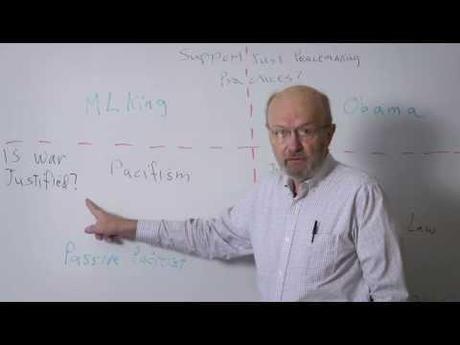
By Alan Bean
I am gratified to see the many tributes to Glen Stassen that have been appeared in the wake of his death last week. My wife Nancy and I got to know Glen very well in the late 1970s when we were both students at the Southern Baptist Theological Seminary. The nuclear power industry was gearing up at the time and a plant was scheduled for construction across the Ohio River in Indiana. If Glen hadn’t brought this to our attention we would have remained oblivious–(Lord knows, none of our other professors were talking about it). Instead, Nancy and I found ourselves in Indiana protesting a nuclear plant that, thankfully, was never built.
Glen Stassen was in love with Jesus’ vision of the kingdom of God. Other professors emphasized Jesus’ kingdom teaching on occasion (I am thinking of Frank Stagg in particular), but Glen built his entire theology on a kingdom foundation. Some would say he was more an Anabaptist than a Baptist, but Glen would have called that a distinction without a difference.
Glen was one of the most intelligent people on the planet, but that isn’t what anyone remembers about him. When you dropped by his office, the books were double stacked because the ample shelves couldn’t contain his personal library. But there was a humility to the man; he was all about converting the ideas of Jesus into action (“praxis” was the word he used).
I will never forget the “ethics luncheons” Glen helped organize at Southern. On one occasion, Duke McCall, the recently retired president of the seminary, defended American economic policy in South America against the critique of the liberation theologians. McCall counted the presidents of several international firms among his personal friends, he told us, and they had assured him that the American presence in the Third World was an unmitigated blessing. Glen didn’t agree, obviously, but he didn’t take the disagreement personally. Glen didn’t think about whether his shirt was tucked in, whether his hair was brushed, what neighborhood he lived in, or what other people thought of him. He just wanted to change the world.
Glen was still teaching at Southern when I returned in 1989 to work on a doctorate in church history and theology. I remember running into him in the book store during the darkest days of “the take over”. While most Southern professors were rending their garments and tossing dust and ashes into the air, Stassen was focused on praxis. “I have had some really productive conversations with the conservative faction,” he told me, “and I’m convinced that, if we consistently employ the peacemaking principles of Jesus, there is still hope for reconciliation.”
In retrospect, there was something almost tragic about Stassen’s trust in the efficacy of kingdom principles. At the time, to be honest, I thought he was hopelessly naive. If anyone else in the moderate camp was thinking along WWJD lines they didn’t share it with me. But who knows, if his approach had been put to the test I’m sure some good things would have happened. Glen really believed the Jesus stuff.
So do I, and Glen is a big part of the reason. How many of us can say the same? Hundreds? Thousands?
If you are interested in reading some the tributes to Glen, here are a few of the best:
Glen served on the board of Sojourners (and was my introduction to the magazine). Jim Wallis has a nice tribute.
David Gushee, a Baptist ethicist who was deeply influenced by Stassen, has also shared an appreciative eulogy.
Mark Baker-Wright, who worked with Glen at Fuller Theological Seminary, has a nice piece on his blog.
Finally, Fred Clark, the best blogger in Christendom, shares his reflections beginning with this wonderful paragraph:
I’ve sometimes joked that Christian ethics is the 2,000-year quest to find loopholes in the Sermon on the Mount. The impressive thing about Glen Stassen was that he took those words of Jesus seriously, making them the foundation of his work rather than an impractical, inconvenient distraction that could or should be explained away.
Amen.
